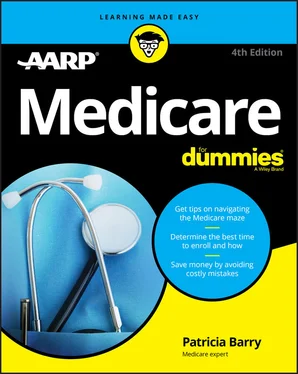1 ...6 7 8 10 11 12 ...19 Help from home health aides in personal activities such as going to the bathroom, bathing, dressing, or preparing a light meal if these are necessary in relation to your illness or injury. (But if this personal care is the only kind of care you need, you don’t qualify for home health coverage.)
Medical supplies such as catheters and wound dressings.
Medical social services such as counseling for social or emotional concerns related to your illness or injury and help finding community resources if you need it.
Medicare covers all these services in full by paying a home health agency a single payment to provide for 60 days of care at a time. Home health care is a valuable benefit, but the rules for qualifying are pretty strict. To get Medicare coverage, you must meet all these conditions:
You must be homebound — that is, unable to leave home without considerable effort, unaided, or at all.
A doctor must certify that you need one or more of the professional services in the preceding list (skilled nursing, physical or occupational therapy, or speech pathology).
You must be under a plan of care established and regularly reviewed by a doctor.
The home health agency caring for you must be approved by Medicare.
If you qualify, the agency must provide all the services specified in the doctor’s plan of care for you. But if you need (or ask for) an item or service that Medicare doesn’t cover, the agency must tell you so in advance and explain what it would cost you. If you need medical equipment, such as a wheelchair or a walker, while receiving home health care, you may get it through the agency, but you pay the normal 20 percent co-pay (as explained later in this chapter) unless you have Medigap insurance that covers that cost.
 For more details on the home health benefit and how to choose and evaluate a home health agency, see the official publication “Medicare and Home Health Care” at
For more details on the home health benefit and how to choose and evaluate a home health agency, see the official publication “Medicare and Home Health Care” at www.medicare.gov/Pubs/pdf/10969-Medicare-and-Home-Health-Care.pdf .
There may come a time when a treatment intended to cure a serious illness stops working effectively or is more than the patient can bear. Hospice care offers an alternative in the last days or months of life. It focuses not on trying to cure the disease but on providing as much comfort as possible — medical, social, emotional, and spiritual — during the time left.
Medicare began covering hospice care in 1983, and it’s one of the most generous benefits that the program provides — at little cost to terminally ill patients or their caregivers. Patients who choose hospice care are offered a full range of medical and support services, most often in their own homes. It also allows them to be cared for temporarily in an inpatient facility, such as a hospital or nursing home, if their regular caregivers need a break.
To qualify for the hospice benefit, you must meet all these conditions:
You must choose to receive hospice care and give up treatments intended to cure your terminal illness.
Your doctor and the medical director of a hospice program must certify that you probably have less than six months to live.
You must enroll in a hospice program that Medicare has approved.
You must have Medicare Part A hospital insurance.
If you qualify, Medicare pays in full — 100 percent — for a wide range of services, including
Medical and nursing care, plus round-the-clock on-call support
Medical equipment and supplies
Homemaker and home health care services
Physical therapy
Social worker services and dietary counseling
Support for your caregiver
Grief and loss counseling for you and your family
Your share of the cost is limited to a maximum of $5 per prescription for drugs used to control the symptoms and pain of your terminal illness, and 5 percent of the cost of respite care if you’re taken into a nursing home to give your caregiver a break. However, if you have Medigap supplemental insurance, both these costs are fully covered, as Chapter 4explains. (Costs related to any medical conditions other than your terminal illness are covered by Medicare Part B or Part D in the usual way.)
 You’re free to stop hospice care any time you want to — and also to resume it again if that’s your wish. Coverage continues for as long as your doctor and a hospice doctor continue to certify that you’re terminally ill, even if you live longer than six months. If your health improves and the doctors decide you no longer need hospice care, the benefit ends — though you still have the right to appeal. If your health deteriorates again, the benefit can resume.
You’re free to stop hospice care any time you want to — and also to resume it again if that’s your wish. Coverage continues for as long as your doctor and a hospice doctor continue to certify that you’re terminally ill, even if you live longer than six months. If your health improves and the doctors decide you no longer need hospice care, the benefit ends — though you still have the right to appeal. If your health deteriorates again, the benefit can resume.
 For more details, see the official publication “Medicare Hospice Benefits” at
For more details, see the official publication “Medicare Hospice Benefits” at www.medicare.gov/Pubs/pdf/02154-Medicare-Hospice-Benefits.pdf .
Palliative care seeks to relieve the symptoms of pain and suffering associated with an illness that may not be terminal but is serious enough to be considered life-threatening. It focuses on improving the quality of life for patients and their caregivers. How is palliative care different from hospice? Well, palliative care does not require patients to give up attempts to cure their illness, and it can be administered at any time, without regard to how long they’re expected to live.
Medicare doesn’t recognize palliative care as a separate benefit. But Medicare may cover its components in other ways under Part B — for example, through the home health-care service described earlier in this chapter or through hospital outpatient departments. If you want to learn more about palliative care or find out where you can get it in your area, discuss local options with your doctor. The Center to Advance Palliative Care offers an online directory of hospitals that provide palliative care at https://getpalliativecare.org/providers/ .
End-of-life care counseling
While nobody wants to be morbid, people are increasingly seeing the sense of drawing up plans for care at the end of their lives — to ensure that their own wishes are respected at that time, even if they’ve reached a point of illness where they’re unable to say what they want. Discussing with a doctor how to make those plans is known as end-of-life counseling, or advance care planning.
The counseling session may include information on making an advance care directive — a legal document in which you specify whether or not you want to continue treatment or be revived if close to death — and on giving someone (a family member, friend, or legal advisor) legal power of attorney to make medical decisions for you if you are incapacitated. It may also provide information about hospice and palliative care (which I cover earlier in this chapter).
Medicare has provided coverage for such discussions since the beginning of 2016 as a benefit you can choose to receive. As it’s voluntary, nobody can require you to take it, and if you are offered it but don’t want it, you’re free to decline, without forfeiting the right to take part sometime in the future. You can decide if and when the time is right to receive counseling: while you’re still well, with no health issues; when you become ill; or while you’re receiving hospice or palliative care.
Читать дальше

 For more details on the home health benefit and how to choose and evaluate a home health agency, see the official publication “Medicare and Home Health Care” at
For more details on the home health benefit and how to choose and evaluate a home health agency, see the official publication “Medicare and Home Health Care” at  You’re free to stop hospice care any time you want to — and also to resume it again if that’s your wish. Coverage continues for as long as your doctor and a hospice doctor continue to certify that you’re terminally ill, even if you live longer than six months. If your health improves and the doctors decide you no longer need hospice care, the benefit ends — though you still have the right to appeal. If your health deteriorates again, the benefit can resume.
You’re free to stop hospice care any time you want to — and also to resume it again if that’s your wish. Coverage continues for as long as your doctor and a hospice doctor continue to certify that you’re terminally ill, even if you live longer than six months. If your health improves and the doctors decide you no longer need hospice care, the benefit ends — though you still have the right to appeal. If your health deteriorates again, the benefit can resume.










